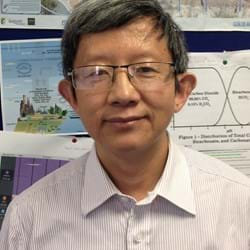【学术交流】牛津大学格林坦普顿学院杨爱东教授学术讲座
文章来源: 发布日期: 2023-07-24
报告题目:From Salad to Steel: Model-based Analysis of Opportunities and Challenges in Renewable Energy Powered Production Systems
in Renewable Energy Powered Production Systems
报 告 人:杨爱东 教授
报告时间:2023.07.26下午16点
报告地点:北京校部主楼F603H
邀 请 人:刘建国 教授
Abstract
To tackle climate change and other environmental and socioeconomic challenges, production systems for supplying food, chemicals and materials are expected to transition from their dependence on fossil fuels to the utilisation of renewable energy (RE). As renewable resources possess rather different characteristics than their fossil fuels, various challenges will arise which need to be addressed to make the transition successful. This talk shares several studies where mathematical modelling has been used to analyse emerging RE-powered systems, including controlled-environment farming, chemical production and steel making. Through these studies, opportunities and challenges are discussed with respect to the implications of the interconnectedness of multiple resources, the strategies for handling variability in renewable energy supply, and the importance of regional resource synergies.
个人简介
Professor Aidong Yang is currently a Fellow of Green Templeton College and an Associate Professor in the Department of Engineering Science at the University of Oxford, where his involvement in the SYNERGORS project ("A Systems Approach to the Synergistic Utilization of Secondary Organic Streams"), which has received strong support from UK and international organizations (academia, industry and government), provides multidisciplinary expertise in tackling landfill, water and air pollution. The Environmental and Biosystems Engineering team formed by Prof. Yang has a very in-depth research in the field of renewable energy as well as the environment. The group combines the engineering of green hydrogen and green ammonia production processes with energy system models to explore the role of green hydrogen and green ammonia in complex and changing energy networks, and collaborates intensively with STFC Rutherford Appleton Laboratory, the world's first round-trip green ammonia pilot plant. The group integrates renewable energy sources such as solar and wind energy with industrial production to explore the intermittency and variability of renewable energy supplies and energy and chemical storage for low-carbon sustainability of industrial processes. For the field of energy and environmental protection, members of the group apply systems engineering tools, such as multi-criteria decision making, mathematical modeling, etc., to achieve the evaluation, improvement and integration of systems for decarbonization in heavy industry, bioenergy for municipal and industrial waste treatment, etc., and make global strategic projections of system potential, and have close collaborative exchanges with the departments of Earth Sciences and Mineral Science and Engineering in this regard.




